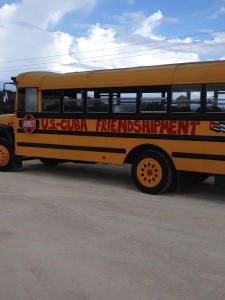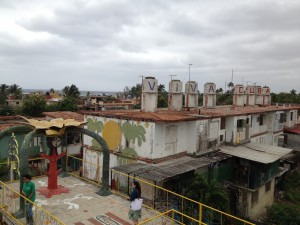Strangers at Home
April 11, 2012 by emburke
My decision to travel to Cuba with a group of 47 Vassar students and three professors was never one that I felt entirely comfortable with. From the outset I had concerns about the very nature of our tourism. The aspects of voyeurism that are inherent to travel seemed to be amplified; the idea of traveling to Cuba as an American tourist, “educational” or not, felt much more like a greedy child waiting to tear the wrapping off a gift that’s been hidden in the attic than an opportunity to experience a different culture in an informed and respectful manner. As we attended class each week and discussed the ramifications of tourism in Cuba my worries only grew. We seemed to establish that while tourism was unquestionably beneficial for growth of the Cuba’s GDP, this was growth that nearly always came at the cost of cultural exploitation and often negative socio-economic conditions in terms of the lives of individual Cubans, particularly those excluded from the tourism sphere. Thus, as our group waited for hours in the Miami International Airport, though I had forced myself not to obsess over our status as a culture consuming American tour group, the reservations I felt about our trip were beginning to manifest themselves in more immediate anxieties about how we would be received by Cubans in Cuba. Ironically, the one aspect of our travel I had failed to anticipate was the one that would prove most troubling: our reception by Cuban Americans in America.

Nationalism in America has ensured that feelings of national identity an My experience in the airport left me feeling a little jarred and confident that our reception in Cuba would mirror that of our experience in Miami. But, I could not have been more incorrect. For the two-week duration of our travel I did not once experience any feeling of estrangement as intense as those sixty minutes spent in our terminal in the Miami International Airport. As a major tourist destination for most of the world, aside from the United States, Cuba is a nation that is filled to the brim with ‘others’. Cubans have come to accept the presence of tourists as a part of life, and in my experiences rarely seemed to view tourism as an intrusion. However, even after countless experiences with amiable, helpful and welcoming Cubans, to some degree I can’t help but to wonder how much of the comfort experienced by tourists in Cuba is a result of a certain level of complacency that has developed in Cuba due to the sheer size of the tourism industry. It seems that at some point, when one presence becomes so heavily developed within society, the tools capable of diminishing that presence can no longer be effective. Additionally, in the case of Cuba, the economic benefits of tourism have created conditions in which Cuba cannot afford to reject tourism as an industry, and so tourists are embraced. However, particularly in light of the conditions presented in the Miami International Airport, it is interesting to consider how tourists might be received in Cuba if the dynamic of tourism dependency in Cuba was reversed, and tourists in Cuba existed within a Cuba that was not catered to tourist comforts, but instead to Cubans. The problematic nature of tourism space in Cuba, and the potential for Cubans to experience feelings of alienation within those spaces is an interesting extension of my own experience, not as a stranger in a strange land, but rather as a stranger in the homeland. belonging are deeply engrained in each and every American, whatever the specific identity of the individual. So, it is an extremely unusual experience to feel intensely estranged in a space that falls within the national sphere. However, upon entering the terminal for chartered flights in the Miami International Airport I nearly immediately experienced a feeling of intense alienation and otherness. I, as a blonde haired, blue eyed, non-Spanish speaking Caucasian, was not easily blending into the nearly entirely Cuban and Cuban American occupied room. As a woman’s voice warbled over the PA system in Spanish, the man sitting across from me looked up and asked if I had caught what she said. I bashfully admit to him that I don’t speak Spanish. None at all? None. He asks if I, and the group I’m with, are going to Cuba. I say yes. He can’t believe it. Through our conversation I learn that my friend is Cuban born, has lived in the United States for nine years, and has just completed nursing school in Miami. He is traveling back to Cuba to visit with family. I also learn that my feelings of ‘otherness’ are not misplaced. He kindly explains that many of the conversations around us have addressed the bizarre group of Americans who appear to be traveling to Cuba. As I talk with him a group sitting behind us makes a joke with him in Spanish. He laughs and turns back to me. He politely translates that they have joked that he should be careful or we are going to ask him to be our tour guide. Already, I feel the edges of my initial anxieties returning. We are American students going to Cuba, and our inquiries are already being perceived as some kind of perverse desire for knowledge of the unknown. It doesn’t help that throughout our conversation, though always polite, he has an air that seems to say that we don’t know what we’re in for. Sitting in the terminal, I wonder if he might be right.
 My experience in the airport left me feeling a little jarred and confident that our reception in Cuba would mirror that of our experience in Miami. But, I could not have been more incorrect. For the two-week duration of our travel I did not once experience any feeling of estrangement as intense as those sixty minutes spent in our terminal in the Miami International Airport. As a major tourist destination for most of the world, aside from the United States, Cuba is a nation that is filled to the brim with ‘others’. Cubans have come to accept the presence of tourists as a part of life, and in my experiences rarely seemed to view tourism as an intrusion. However, even after countless experiences with amiable, helpful and welcoming Cubans, to some degree I can’t help but to wonder how much of the comfort experienced by tourists in Cuba is a result of a certain level of complacency that has developed in Cuba due to the sheer size of the tourism industry. It seems that at some point, when one presence becomes so heavily developed within society, the tools capable of diminishing that presence can no longer be effective. Additionally, in the case of Cuba, the economic benefits of tourism have created conditions in which Cuba cannot afford to reject tourism as an industry, and so tourists are embraced. However, particularly in light of the conditions presented in the Miami International Airport, it is interesting to consider how tourists might be received in Cuba if the dynamic of tourism dependency in Cuba was reversed, and tourists in Cuba existed within a Cuba that was not catered to tourist comforts, but instead to Cubans. The problematic nature of tourism space in Cuba, and the potential for Cubans to experience feelings of alienation within those spaces is an interesting extension of my own experience, not as a stranger in a strange land, but rather as a stranger in the homeland.
My experience in the airport left me feeling a little jarred and confident that our reception in Cuba would mirror that of our experience in Miami. But, I could not have been more incorrect. For the two-week duration of our travel I did not once experience any feeling of estrangement as intense as those sixty minutes spent in our terminal in the Miami International Airport. As a major tourist destination for most of the world, aside from the United States, Cuba is a nation that is filled to the brim with ‘others’. Cubans have come to accept the presence of tourists as a part of life, and in my experiences rarely seemed to view tourism as an intrusion. However, even after countless experiences with amiable, helpful and welcoming Cubans, to some degree I can’t help but to wonder how much of the comfort experienced by tourists in Cuba is a result of a certain level of complacency that has developed in Cuba due to the sheer size of the tourism industry. It seems that at some point, when one presence becomes so heavily developed within society, the tools capable of diminishing that presence can no longer be effective. Additionally, in the case of Cuba, the economic benefits of tourism have created conditions in which Cuba cannot afford to reject tourism as an industry, and so tourists are embraced. However, particularly in light of the conditions presented in the Miami International Airport, it is interesting to consider how tourists might be received in Cuba if the dynamic of tourism dependency in Cuba was reversed, and tourists in Cuba existed within a Cuba that was not catered to tourist comforts, but instead to Cubans. The problematic nature of tourism space in Cuba, and the potential for Cubans to experience feelings of alienation within those spaces is an interesting extension of my own experience, not as a stranger in a strange land, but rather as a stranger in the homeland.
Leave a Reply
You must be logged in to post a comment.